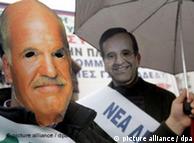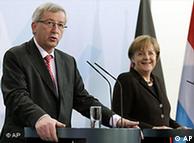Ίδρυμα καταπιστευτικής διαχείρισης στο πρότυπο της γερμανικής Treuhand, ανεξάρτητο από την ελληνική κυβέρνηση, προτείνει ο πρόεδρος του Eurogroup για την προώθηση των αποκρατικοποιήσεων στην Ελλάδα.
«Θα χαιρέτιζα την σύσταση από τους Έλληνες φίλους μας μιας ανεξάρτητης υπηρεσίας ιδιωτικοποιήσεων στο πρότυπο της Treuhand» τόνισε σε συνέντευξή του προς το περιοδικό Der Spiegel ο Ζαν Κόντ Γιούνκερ διευκρινίζοντας ότι αυτή η υπηρεσία θα πρέπει να στελεχωθεί από ξένους ειδικούς.
Υπενθυμίζεται ότι η Treuhand είχε συγκροτηθεί μετά την επανένωση της Γερμανίας με στόχο την ιδιωτικοποίηση της κρατικής περιουσίας της «Λαϊκής Δημοκρατίας της Γερμανίας». Η δραστηριότητα της έχει αμφισβητηθεί από πολλούς, καθώς σε κάποιες περιπτώσεις κατηγορήθηκε για εκποίηση των κρατικών επιχειρήσεων. Σε γενικές γραμμές, εκτιμάται ότι διεκπεραίωσε μ επιτυχία την αποστολή της.
ΠΑΣΟΚ και ΝΔ να σταματήσουν τις διαμάχες
 Bildunterschrift: Großansicht des Bildes mit der Bildunterschrift: ΠΑΣΟΚ και ΝΔ να στηρίξουν από κοινού τις μεταρρυθμίσεις, ζητά ο Γιούνκερ
Bildunterschrift: Großansicht des Bildes mit der Bildunterschrift: ΠΑΣΟΚ και ΝΔ να στηρίξουν από κοινού τις μεταρρυθμίσεις, ζητά ο Γιούνκερ «Η ΕΕ θα παρακολουθεί τόσο στενά το πρόγραμμα ιδιωτικοποιήσεων της Ελλάδας ωσάν να το υλοποιούσε η ίδια», πρόσθεσε σε άλλο σημείο ο κ. Γιούνκερ. Ιδιαίτερη έμφαση έδωσε επίσης στην ανάγκη τα δύο μεγάλα κόμματα, το ΠΑΣΟΚ και η Νέα Δημοκρατία να σταματήσουν τις μικροδιαμάχες τους. Κοιτάζοντας προς την αξιωματική αντιπολίτευση τόνισε ότι «κυβέρνηση και αντιπολίτευση θα πρέπει να διακηρύξουν από κοινού ότι στηρίζουν τις συμφωνίες με την ΕΕ για τις μεταρρυθμίσεις». Και όχι μόνο. Ο πρόεδρος του Eurogroup επισημαίνει στην συνέντευξή του ότι μόνο όταν σταθεροποιηθούν τα δημοσιονομικά της Ελλάδας θα γίνουν σκέψεις για επιμήκυνση της αποπληρωμής των ομολογιακών της υποχρεώσεων και μείωση των επιτοκίων.
Μέρκελ: Όχι στην αναδιάρθρωση
 Bildunterschrift: Großansicht des Bildes mit der Bildunterschrift: Νέο "όχι" στην αναδιάρθρωση από τη Μέρκελ
Bildunterschrift: Großansicht des Bildes mit der Bildunterschrift: Νέο "όχι" στην αναδιάρθρωση από τη Μέρκελ Μιλώντας σήμερα για την κρίση χρέους στην ευρωζώνη, η καγκελάριος Α. Μέρκελ απηύθυνε προειδοποίηση για τους κινδύνους απλοϊκών λύσεων, όπως η αναδιάρθρωση του ελληνικού χρέους. Η Ελλάδα έλαβε δάνεια με διάρκεια πέραν του 2012 και γι’ αυτό δεν μπορούν τώρα να αλλάξουν γρήγορα οι κανόνες, διευκρίνισε η καγκελάριος.
Σε κομματική συγκέντρωση της Χριστιανοδημοκρατικής Ένωσης, CDU, στο Ludwigslust (Μεκλεμβούργο-Πομμερανία) η κα Μέρκελ επανέλαβε ότι στην ευρωζώνη θα πρέπει μελλοντικά να τηρούνται όχι μόνο οι κανόνες για το χρέος, αλλά είναι απαραίτητη και η εξομοίωση στον τομέα της κοινωνικής πολιτικής.
http://www.dw-world.de/dw/article/0,,15095606,00.html
_________________________________________________
The Treuhandanstalt (German: Trust agency) was the agency that privatized the East German enterprises, Volkseigener Betrieb (VEBs), owned as public property. Created by the Volkskammer on June 17, 1990, it oversaw the restructuring and selling of about 8,500 firms with initially over 4 million employees. At that time it was the world's largest industrial enterprise, controlling everything from steel works to the Babelsberg Studios.
The Treuhand was responsible for more than just the 8500 state-owned enterprises (Volkseigener Betriebe or VEBs). It also took over around 2.4m hectares of agricultural land and forests; the property of the former Stasi; large parts of the property of the former National People's Army, largescale public housing property as well as the property of the state pharmacy network. At reunification on 3 October 1990 it also took over the property of the political parties and mass organisations of the German Democratic Republic.[1]
Its operations drew criticism from some quarters for unnecessarily closing of profitable businesses, misuse and waste of funds and unnecessary layoffs. It also drew substantial protests from the workforces affected, as 2.5m employees in state-owned enterprises (out of 4m in total) were laid off in the early 1990s. The then chairman of the Treuhand, Detlev Karsten Rohwedder was shot and murdered on 1 April 1991 by an unknown assassin (possibly the Red Army Faction). He was succeeded by Birgit Breuel.
When its operations ended in 1994, it had amassed 260 to 270b DM in debt. Supporters argued that without placing the former state-owned enterprises into private hands, job losses would have been much higher, and economic recovery slower.[2]
Although the Treuhand closed operations in 1994, it still retained much property and some other legal responsibilities. These were transferred to 3 successor agencies:
In July 2008 the BVVG announced total privatization receipts of EUR3.5bn since its establishment in 1992, which it had gained through the sale of around 525,000 hectares of agricultural land, with a similar amount of forest land and a small amount of other land. Total land sales amounted to around half the area of the state of Saxony-Anhalt. At the end of 2007 it still owned over 500,000 hectares of agricultural land, and just under 100,000 of forest land. [5]
http://en.wikipedia.org/wiki/Treuhand
_________________________________________________
The Treuhandanstalt (German: Trust agency) was the agency that privatized the East German enterprises, Volkseigener Betrieb (VEBs), owned as public property. Created by the Volkskammer on June 17, 1990, it oversaw the restructuring and selling of about 8,500 firms with initially over 4 million employees. At that time it was the world's largest industrial enterprise, controlling everything from steel works to the Babelsberg Studios.
The Treuhand was responsible for more than just the 8500 state-owned enterprises (Volkseigener Betriebe or VEBs). It also took over around 2.4m hectares of agricultural land and forests; the property of the former Stasi; large parts of the property of the former National People's Army, largescale public housing property as well as the property of the state pharmacy network. At reunification on 3 October 1990 it also took over the property of the political parties and mass organisations of the German Democratic Republic.[1]
Its operations drew criticism from some quarters for unnecessarily closing of profitable businesses, misuse and waste of funds and unnecessary layoffs. It also drew substantial protests from the workforces affected, as 2.5m employees in state-owned enterprises (out of 4m in total) were laid off in the early 1990s. The then chairman of the Treuhand, Detlev Karsten Rohwedder was shot and murdered on 1 April 1991 by an unknown assassin (possibly the Red Army Faction). He was succeeded by Birgit Breuel.
When its operations ended in 1994, it had amassed 260 to 270b DM in debt. Supporters argued that without placing the former state-owned enterprises into private hands, job losses would have been much higher, and economic recovery slower.[2]
Although the Treuhand closed operations in 1994, it still retained much property and some other legal responsibilities. These were transferred to 3 successor agencies:
- the Bundesanstalt für vereinigungsbedingte Sonderaufgaben, BvS (Federal Agency for Unification-derived Special Tasks), which managed remaining state-owned enterprises;
- the Treuhandliegenschaftsgesellschaft (now TLG Immobilien GmbH), which manages the remaining state-owned urban and industrial real estate;
- the Bodenverwertungs- und -verwaltungs GmbH (BVVG), a subsidiary of the Treuhand created in 1992, which manages the state-owned agricultural land, forest lands, and related real estate.
In July 2008 the BVVG announced total privatization receipts of EUR3.5bn since its establishment in 1992, which it had gained through the sale of around 525,000 hectares of agricultural land, with a similar amount of forest land and a small amount of other land. Total land sales amounted to around half the area of the state of Saxony-Anhalt. At the end of 2007 it still owned over 500,000 hectares of agricultural land, and just under 100,000 of forest land. [5]
http://en.wikipedia.org/wiki/Treuhand





No comments:
Post a Comment